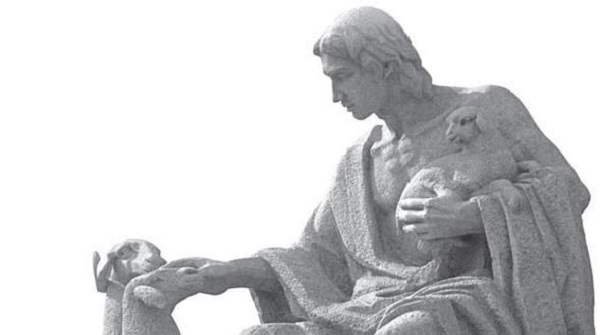The prophet under the juniper tree
Exploring Priests and Depression

▲The prophet Elijah was also extremely depressed and cried out to God under the juniper tree.
The prophet Elijah rebuked King Ahab of Israel for his implacable face. He defeated the prophets of Baal in a duel on Mount Carmel and repeatedly witnessed the power of Jehovah. However, when Queen Jezebel threatened him, he was so frightened that he ran to the foot of a juniper tree and cried out to God:"O Lord, no more, please take my life." (Refer to 1 Kings 20:4)
What made Elijah, God’s important servant, so desperate? Preachers who are very zealous for the cause of God will sometimes be unable to lift their aching legs or their sinking hands, or even when they want to die like Elijah?
Yes. Such a situation is not just about feeling depressed, not just about physical and mental exhaustion, and not just about being temporarily depressed. When a pastor who has always been running around for ministry, who preaches with great ability, and who is always there whenever something happens to his members begins to lose appetite and sleep, avoids crowds, shows extreme anxiety, and even contemplates suicide, He was probably suffering from depression.
A 2009 report in USA Today (http://usatoday30.usatoday.com/news/religion/2009-10-28-pastor_suicides_N.htm) pointed out that according to the American Medical Association (AMA) ) study, 12% men and 26% women will experience depression throughout their lives. The proportion of pastors suffering from depression is also similar. Matthew Stanford, a professor of psychological and brain sciences at Baylor University in Texas, even estimated that about a quarter of pastors suffer from depression.
The information section of this issue lists the causes and symptoms of depression, as well as steps for seeking treatment. Here, let us first try to explore the possible reasons why pastors suffer from depression and how to deal with it based on the characteristics of pastoral service.
Serving brings stress
Pastor Ye Gaofang, president of the International True Love Family Association, has pastored the church for many years and is also engaged in counseling. He has always cared about pastoral families. He analyzed that pastors serve many and complex projects, including church administration, member care, marriage counseling, Bible teaching, community services... In many cases, it can be said that all matters inside and outside the church are handled by one hand. Pastors also have no clear "off-duty hours" and are often on call around the clock. If something happens to a member of the congregation, the pastor is often the first to intervene. Different members bring different demands, but they expect the pastor to cover everything. This service quality creates great pressure.
Ye Gaofang further pointed out that many pastors are too busy serving and neglecting their families, causing imbalances in the relationship between husband and wife and parent-child relationships, creating another kind of pressure.
Moreover, because the pastor is the leader who is highly visible to the church members, pastors are expected to meet unnaturally high standards. The pastor’s words, deeds, and attitude are criticized more than encouraged, and judgments are given more than thanks. As a result, the pastor feels that the service is ineffective, and his frustration gradually deepens. Moreover, because pastors rarely have anyone to talk to, the accumulated inner hurt cannot be properly vented and dealt with for a long time. As long as they encounter unexpected events in life, such as the death of a relative, changes in service, conflicts with elders, or experiencing major Surgery, etc., can be the tipping point that takes a pastor from depression and despair to clinical depression.
Like the prophet Elijah, he seemed capable and unflinching when faced with challenges one after another, each one more difficult than the last. But as soon as the peak of service was over and his life was threatened, he immediately fell into an emotional low of fear and anxiety. The servant of God, exhausted both physically and mentally, seemed to have lost all strength and enthusiasm. Will this be the end of his ministry and the end of his life?
Whole person therapy
Pastors who show symptoms of depression must seek help. Since this is the result of the mutual influence of body, mind and soul, the treatment methods adopted should also start from the level of whole-person care. When the pastor was diagnosed with clinical depression by a doctor, Ye Gaofang suggested that the pastor should first rest, such as Elijah fell asleep under the juniper tree, to give the body a chance to relax.
Many studies have found that regular exercise habits can help increase your sense of self-worth, reduce stress, and aid sleep. Endorphins and serotonin produced by exercise are beneficial to emotional health.
Although no research has shown that specific foods can cure depression, a balanced diet is one of the prerequisites for maintaining physical and mental health. For example: increase fiber intake (including fruits, vegetables and whole grains), choose foods with high antioxidant content, and reduce fried and high-sugar foods.
Antidepressants prescribed by your doctor usually reduce symptoms within a few weeks. However, not all drugs and doses can have the same effect on everyone, and drugs can also cause side effects. During the period of taking the drugs, you need to keep close contact with your doctor and observe changes in your condition from time to time. Once the symptoms are relieved, do not stop taking the medicine on your own to avoid recurrence of the condition.
Ye Gaofang also emphasized that only by finding out the root causes of depression in the heart and soul can the root cause be cured. Cooperate with psychological and spiritual counseling to thoroughly examine your lifestyle, time planning, interpersonal relationships, service attitude, and relationship with God, and make appropriate changes to prevent the recurrence of old illnesses.
People with depression usually think about themselves and feel that they are not good enough. They are very concerned about what others think of them, and they are deeply afraid that others will find out about their illness and look down on themselves even more. In counseling, we target these distorted thoughts and find out the crux - pride, past physical and mental harm, the nature to please others... Under the guidance of psychological or spiritual counseling, patients learn to identify negative thoughts, deliberately control them, and through the counselor's encouragement, let God's words replace these thoughts and truly understand their own value in the eyes of God. Changing from self-centered to God-centered thinking requires time to practice and constant reminders from counselors.
When depression is severe, you will feel reluctant to get out of bed, afraid to go out, and seem to have no strength and cannot do anything. When the condition improves slightly and physical strength gradually returns, caregivers need to be careful. At this time, the patient is most likely to take actions that harm others or themselves. For example, USA Today reported that Pastor Cui, who pastors a church in North Carolina, admitted to his congregation that he suffered from depression and began receiving treatment. However, a few months later, he chose to end his life.
During the recovery process from depression, the company of family members is very important. Ye Gaofang suggested taking a walk with the patient, exercising on the one hand, and listening to the patient on the other. At this time, we need to be considerate and understanding wisely instead of preaching or urging you to get better quickly.

▲The warm family allows the shepherd to rest and recharge before starting again.
Support from family and church
When a preacher first enters the service field, whether he is pastoring, missionary, or serving in a gospel organization, he should be clear about God's call. Only with a vision can he have a direction. However, Ye Gaofang reminded us sincerely that after serving for a period of time, if you turn your attention from God to people and only care about people but not God, you will easily lose the right direction.
He pointed out that some preachers consider that their own destiny is in the hands of the elders and the congregation, and make compromises that violate their aspirations when they were called, and deviate from the focus of service and the attitude of a servant. Although everyone seems happy in the moment, in the long run there will be struggles and pressures, and choices must be made. When the responsibilities entrusted by God and human expectations cannot coincide, the resulting contradictions often become the foreshadowing of depression.
This unit has repeatedly focused on how to care for pastors (please refer to the relevant reports in issues 19, 20, 21, and 27 of the "Kingdom of God" magazine). Ye Gaofang also hopes that when the "Pastoral Search Committee" completes its tasks, the church will be reorganized into a "Pastoral Search Committee" Pastoral Love Committee". In addition to caring about the lives of pastors and family members and praying for them all the time, members should give pastors more affirmation than criticism, and encourage more than judgement. The elders also need to examine the responsibilities of the pastor and the model of co-workers. They should not push large and small matters to the pastor, so that the pastor can concentrate on praying, teaching and training, and become a spiritual leader who coordinates and trains all members to work towards a common vision.
Once it is known that a pastor is suffering from depression, the understanding and acceptance of the church members will be the greatest encouragement for the pastor to recover. Although the pastor is a spiritual leader, he is still a part of the entire body of the church. If any member is injured, he needs help and support from other parts.
Ye Gaofang also encouraged the pastor's family to become the pastor's closest partner and strongest support so that the pastor can serve without worries, because a harmonious family life is often the best stress reliever. Even if he is tired of facing challenges from all kinds of people and things, a warm family allows the pastor to rest and recharge before starting again. He believes that family is the biggest key to keeping a pastor on time and in a good mood for ministry. Therefore, pastors themselves also need to pay attention to the relationship between husband and wife and parent-child, and maintain a balance between service and family life.
Recovery is expected
There are currently some pastoral retreat centers in North America (please see information on pages 60 to 61), which can provide a quiet place for pastors, missionaries and other full-time servants of God to rest. Residential counseling lasting several weeks can even be more effective. Let pastors get professional help, recover physically, mentally, and spiritually, and restore their relationships with themselves, others, and God.
Based on Ye Gaofang's experience and professional knowledge, he can understand the difficulties faced by pastors. He knows that even if they suspect that they are suffering from depression, they are reluctant to seek medical treatment. On the one hand, they are afraid that church colleagues and members will have "bad testimonies" once they find out. ”, on the one hand, I am also afraid of being forced to leave my ministry. He sincerely appealed to these pastors to accept the fact that they were sick and seek professional diagnosis and medical treatment as soon as possible. After all, pastors are also human beings, and as long as they are human beings, they will get sick, regardless of physical, mental or spiritual aspects.
The causes of depression are complex. Without professional medical treatment and counseling, it will not only damage your physical health, but also affect your relationships with family members and believers. After gradually losing interest in reading the Bible and praying, the patient also has a tendency to "hide from God" and become alienated from God. In this case, how can we effectively serve God? Is maintaining the illusion of health a "good testimony"?
A pastor who suffered from depression compared the disease to termites, which unknowingly eat away at the body and soul. Once termites are discovered, how can one sit back and do nothing and expect the problem to go away? Seeking healing takes courage, but God will accompany us through the valley of healing.
Ye Gaofang encourages pastors with her own way of handling stress. No matter what kind of service he does, he believes that it is God’s arrangement and tries his best to do his best, not to please others, but to please God and be responsible to God. Even if he encountered difficulties, he thanked God for giving him the opportunity to serve and prayed for God’s help in completing this stage of the task. When he was going through the low points of his ministry, he sought the company of God and his family. When he climbed to the peak of his ministry, he was reminded of his limitations and gave glory to God.
The prophet Elijah, who was so depressed that he wanted to die, wailed to God under the juniper tree. Jehovah God did not answer immediately, but first provided water and bread. After Elijah had had enough sleep and food, and his strength had temporarily recovered, he obeyed God's instructions and came to Mount Horeb to meet God.
After the fierce wind and fire, God affirmed to Elijah in a small voice that he was not alone. God Himself had preserved seven thousand godly people. After the divine encounter with Jehovah, Elijah’s body, mind and soul were renewed, and he set out again to continue to carry out God’s commission and preach God’s power.
What we believe in is indeed a God of healing and restoration.

▲Just as God healed Elijah, He will also accompany pastors experiencing depression to restore them and renew their bodies, minds, and souls.
 Interviewee profile
Interviewee profile
Dr. Ye Gaofang is currently the president of the International True Love Family Association. He has been engaged in family education and counseling for nearly 40 years. He is a well-known family education and counseling expert. He has a doctorate in family counseling and a doctorate in psychology. He is particularly responsible for caring and counseling for pastoral families. His famous saying is that after the "Pastoral Search Committee" hires a pastor, it should be reorganized into the "Pastoral Love Committee" and should never be disbanded.
 Author profile
Author profile
Lin Minwen devotes herself to literary ministry and focuses on writing and editing.
